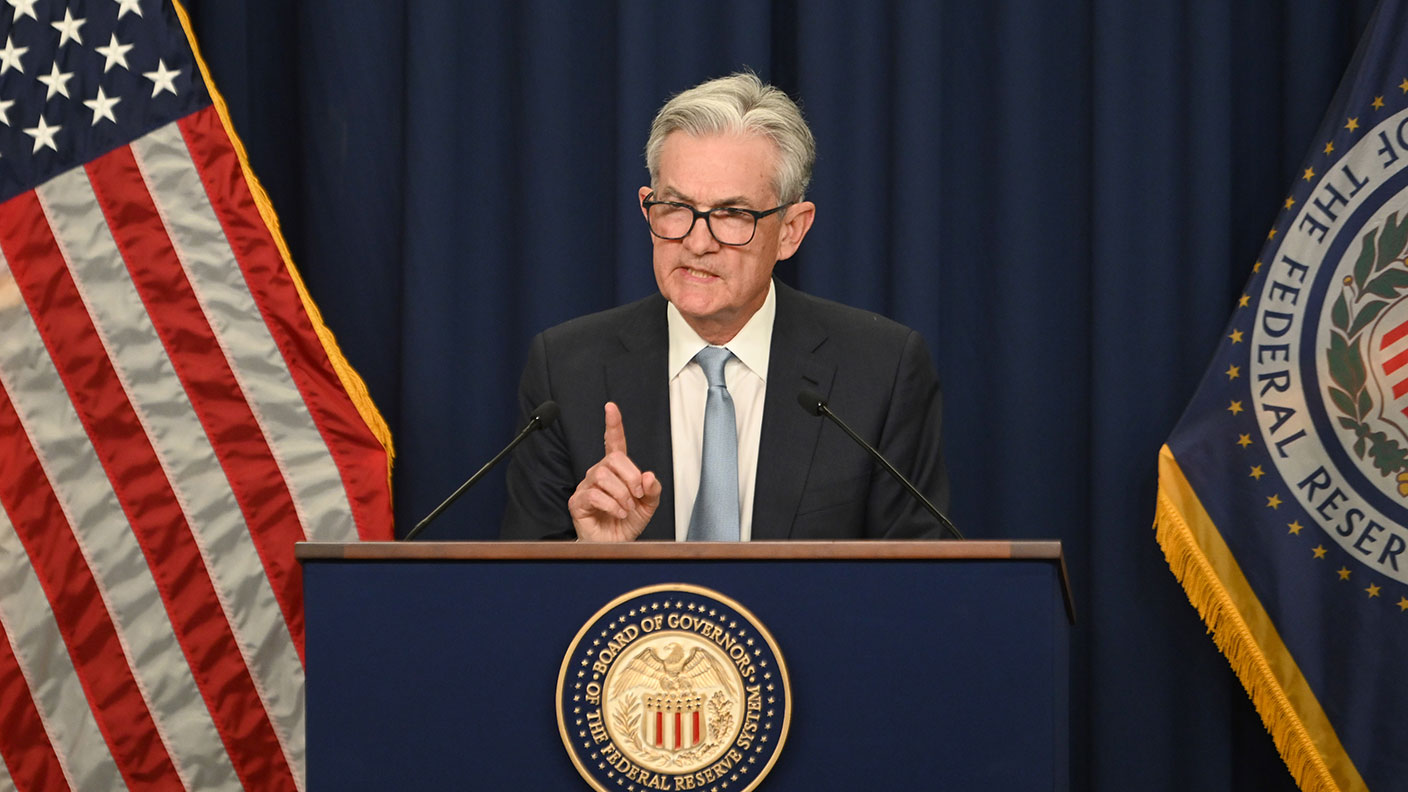Get the latest financial news, insights and expert analysis from our award-winning MoneyWeek team, to help you understand what really matters when it comes to your finances.
You are now subscribed
Your newsletter sign-up was successful
Want to add more newsletters?

Twice daily
MoneyWeek
Get the latest financial news, insights and expert analysis from our award-winning MoneyWeek team, to help you understand what really matters when it comes to your finances.

Four times a week
Look After My Bills
Sign up to our free money-saving newsletter, filled with the latest news and expert advice to help you find the best tips and deals for managing your bills. Start saving today!
This article was first published on 8/10/2006
Last week was a busy week on all fronts for market watchers. Metal prices fell hard early in the week but rallied sufficiently by mid-week to offset their losses and in the case of lead, zinc and aluminum, rallied well past their price levels of a few weeks ago. Gold, in spite of a late-week rally, is still off about 5% from the previous week's price.
The Dow Jones Industrial Index broke a new record high and bonds rallied alongside it, with the gains in longer-term bonds keeping pace with the gains in the stock market. I find that a bit unusual: short-term interest rates have been on hold for several months so the rise in longer term bonds is further inverting the yield curve, and an inverted yield curve usually forecasts economic trouble ahead.
MoneyWeek
Subscribe to MoneyWeek today and get your first six magazine issues absolutely FREE

Sign up to Money Morning
Don't miss the latest investment and personal finances news, market analysis, plus money-saving tips with our free twice-daily newsletter
Don't miss the latest investment and personal finances news, market analysis, plus money-saving tips with our free twice-daily newsletter
Along those lines I wasn't surprised to see metals drop early in the week: weakening US economic growth means less demand for raw materials and hence lower base metals prices. I also expected to see the gold price fall in tandem with base metals as it had rallied with them from mid-2005 to May this year.
What is surprising is the strength in US stocks. When a major stock index such as the Dow breaks a new record it means the outlook for the economy is good. Is it possible, therefore, that I am completely wrong worrying about slowing economic growth? Could high base metals prices and the rising stock market both be telling us that economic growth is fundamentally strong and here to stay?
Stock market gains: bonds vs. stocks
Bonds are rallying because bond investors are forecasting that the decline in economic growth will be sufficient to curb price inflation and therefore the Fed will not have to raise the overnight rate anytime soon and could, in fact, start cutting rates again.
That puts bond investors diametrically opposite stock investors. Stocks should not be rallying if the forecast for economic growth is negative. We can reconcile the rise in bond prices with the rise in stock prices if we believe the US economy has found a perfect balance between economic growth and price stability, a position referred to as the Goldilocks economy, which is about as probable as finding Goldilocks herself in your own back yard.
Enjoying this article? For two recommended articles like this every day, plus the latest investment news and opinion from MoneyWeek, sign up to our FREE daily email, Money Morning. CLICK HERE
There is another way to correlate rising bond prices with rising stock prices. American companies issued a record $204 billion worth of bonds during the third quarter. Corporate bond issuances for the first three quarters of this year are already $677 billion, just a few billion shy of last year's entire issuances of $689 billion, which was a record high. What are these companies doing with all that cash? Are they buying back shares? That would explain why stock prices are strong in spite of dire economic predictions.
Six years ago when the stock market broke new record highs the dollar was also at record high levels as foreign capital poured into the US in search of financial assets. This time, however, the dollar barely budged. The rise in stock prices today does not appear to be driven by international demand for US equities. The rise in US equity prices makes no fundamental sense at all, and that probably means stock prices are going to become very volatile.
What effect has the housing slump had?
Last time the stock market broke new ground there was euphoria on the Exchange floors and jubilation in the streets. This time, the response is far more muted. According to an article in the Wall Street Journal, floor traders were more concerned with layoffs than with celebrating record high stock prices.
Americans are still refinancing their homes and converting home equity into cash, with $124 billion extracted through cash-out refinancings during the second quarter. That is down sharply from last year, but it is still a lot of money. A continuing decline in cash-out refinancings will negatively impact consumer spending and thus reduce US economic growth. Consumer spending accounts for 70% of US economic activity, and so it's not something to be ignored.
Ben Bernanke, the Chairman of Board of Governors of the Federal Reserve Bank, recently said there is limited evidence that the decline in the housing sector has spilled over into other parts of the economy. The housing market peaked a year ago and consumer spending and sentiment is still relatively strong. But while both he, and Mr. Donald Kohn, the Fed's Vice Chairman, have downplayed the impact of the housing market on economic growth, Mr. Bernanke also said that he thought the decline in the housing sector could reduce US economic growth by a full percentage point during the second half of this year and into next year, from what it otherwise would have been, and Mr. Kohn admitted that the decline in housing construction and home sales has been more rapid and deeper than many economists predicted.
For the time being it seems that the Fed is more concerned about inflation than weakness in the economy. Mr. Kohn said that while weaker economic growth is a concern, the risk of higher inflation is a greater concern at the moment. For his part, Mr. Bernanke said that price inflation is above the level the Fed would like it to be but added that the weakening economy could ease the pressure on price inflation.
As you can tell by now, there is very little consensus about what is to come. Even though the Fed keeps talking about the risks of inflation the bond market is clearly predicting that the economy is going to weaken to such an extent that the Fed will have to cut interest rates. All this while the stock market is rallying.
Back to basics: why you should continue to hold gold
One thing I think we can all agree on is that there is a lot of confusion and uncertainty at the moment. During such times it is often useful to go back to basics, and I mean really basic stuff.
The object of investing is to make money. That requires us to buy low and sell high. Right now US stocks are at record highs, long bonds are not quite at a record high but they are very high, and commodities are just slightly off their record highs. No buying candidates there.
Want to read more about gold? See our section on investing in gold for more news and views on the yellow metal.
In markets like this you could either be bold or defensive. I prefer to be bold when others are not and right now there is an oversupply of boldness, so I'm defensive. The ultimate defensive position is cash. For some that means US dollars, or Canadian dollars, or euros, or yen. For me the ultimate form of cash is gold since I believe gold is money, with one big distinction: it is not a floating abstraction created by a bankrupt government supported only by legislation and the confidence of a brainwashed population.
Gold is down more than 20% from its highs in May. With the gold price under $600 an ounce the metal is attractive once again, but don't interpret that to mean the gold price could not fall further from here. In the short term the biggest risk to the gold price remains the fact that base metals prices are way too high and when they fall they could drag the gold price down even further.
I would be ecstatic if the gold price fell further - the lower the better. It doesn't matter that my current positions would decline in price because the intrinsic value of the companies I own, and the gold I have, would not change, and the lower the prices fall the less I have to pay for the same intrinsic value.
You panic and sell when prices fall only when you don't know the intrinsic value of your investments. When you do know what your assets are worth it is easy to sell them when they are over-priced and easy to buy more when they are under-valued.
First published on Kitco.com (www.kitco.com)
By Paul van Eeden
Paul van Eeden works primarily to find investments for his own portfolio and shares his investment ideas with subscribers to his weekly investment publication. For more information please visit his website (www.paulvaneeden.com). If you would like to read more from Paul, you can sign up to get his weekly commentary at https://www.paulvaneeden.com/commentary.php.
Get the latest financial news, insights and expert analysis from our award-winning MoneyWeek team, to help you understand what really matters when it comes to your finances.
MoneyWeek is written by a team of experienced and award-winning journalists, plus expert columnists. As well as daily digital news and features, MoneyWeek also publishes a weekly magazine, covering investing and personal finance. From share tips, pensions, gold to practical investment tips - we provide a round-up to help you make money and keep it.
-
 Should you buy an active ETF?
Should you buy an active ETF?ETFs are often mischaracterised as passive products, but they can be a convenient way to add active management to your portfolio
-
 Power up your pension before 5 April – easy ways to save before the tax year end
Power up your pension before 5 April – easy ways to save before the tax year endWith the end of the tax year looming, pension savers currently have a window to review and maximise what’s going into their retirement funds – we look at how
-
 As China reopens, why pick an income strategy?
As China reopens, why pick an income strategy?Advertisement Feature Yoojeong Oh, Investment Manager, abrdn Asian Income Fund Limited
-
 A new dawn for Asian markets?
A new dawn for Asian markets?Advertisement Feature James Thom, Investment Manager, abrdn New Dawn Investment Trust plc
-
 The end of cheap money hits the markets
The end of cheap money hits the marketsNews Markets have swooned as central banks raise interest rates, leaving the era of cheap money behind.
-
 Are stocks back in a bull market or is this just a bear market rally?
Are stocks back in a bull market or is this just a bear market rally?News The S&P 500 index gained 17% between its June lows and 16 August, while the Nasdaq Composite rose more than 20%. So are stocks back in a bull market or is this just a brief rally before they resume their slide?
-
 Enjoy the bear market rally while it lasts
Enjoy the bear market rally while it lastsNews Investors seem to think that a weaker US economy will cool inflation and see the Fed relent on interest rate rises. But that optimism may be misplaced, with July’s stockmarket gains looking very much like a bear-market rally.
-
 The Fed really is fighting inflation – so don’t expect an early end to the bear market
The Fed really is fighting inflation – so don’t expect an early end to the bear marketAnalysis In an attempt to contain raging inflation, the Federal Reserve has raised US interest rates by 0.75 percentage points. And it’s going to keep on raising them till something breaks, says John Stepek.
-
 The Federal Reserve wants markets to fall – here’s what that means for investors
The Federal Reserve wants markets to fall – here’s what that means for investorsAnalysis The Federal Reserve’s primary mandate is to keep inflation down, and lower asset prices help with that. So, asks Dominic Frisby – just how low will stockmarkets fall?
-
 Interest-rate rises mean more pain for stocks
Interest-rate rises mean more pain for stocksNews Interest rates are rising around the world as central banks try to get inflation under control. That’s hitting stockmarkets – and there is more pain to come.

